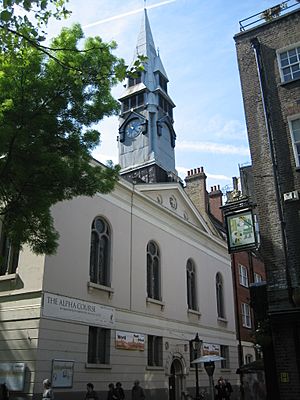St George the Martyr, Holborn facts for kids
51°31′16″N 0°07′19″W / 51.5210265°N 0.1220766°W
Quick facts for kids St George the Martyr Holborn |
|
|---|---|
 |
|
| Location | 44 Queen Square, London |
| Country | United Kingdom |
| Denomination | Anglican |
| Churchmanship | Low Church |
| Architecture | |
| Heritage designation | Grade II* |
| Designated | 24 October 1951 |
| Architect(s) | Arthur Tooley, John Buonarotti Papworth, Samuel Sanders Teulon |
| Years built | 1703 |
| Administration | |
| Parish | Holborn St George |
| Archdeaconry | Hampstead |
| Diocese | London |
St George the Martyr Holborn is an Anglican church in London. You can find it at the south end of Queen Square in Holborn. The church is named after Saint George. It was first called "St George the Martyr" to tell it apart from another nearby church, St George's Bloomsbury. Both churches used to share a burial ground, which is now called St George's Gardens. Today, most people just call it St George's Holborn.
Contents
History of St George's Holborn
Building the Church
The church was built between 1703 and 1706. A person named Arthur Tooley was the architect. He was paid £3,500 by a group of fifteen people, including Sir Streynsham Master. At first, it was a "chapel of ease." This means it was a smaller church built to help people who lived far from the main parish church.
Later, a group called the "Commission for Building Fifty New Churches" bought it. This group was set up to build many new churches in London. In 1723, St George's Holborn became a full parish church. It was dedicated to Saint George to honor Streynsham Master. He had been a governor at a place called Fort St George in India.
Changes Over Time
A famous old writer and doctor, William Stukeley, was the church's rector from 1747 until he passed away in 1765.
The church building has been changed several times. In the early 1800s, J.B. Papworth redesigned it. He added a bell-tower and two new front parts to the building. Before this, it was a simple brick building.
Then, from 1867 to 1869, S. S. Teulon made even bigger changes. He almost completely changed the outside of the church. He also removed the old balconies inside and added the columns and roof you see today.
Famous Events at the Church
On Bloomsday in 1956, two famous poets got married here. They were Ted Hughes and Sylvia Plath.
Protecting the Church
Historic Building Status
St George the Martyr Holborn is a very important building. On October 24, 1951, it was given a special status. It became a Grade II* listed building. This means it is a building of special historical or architectural interest. It is protected to make sure it stays safe for the future.
The Church Organ
The organ inside the church is also very special. The British Institute of Organ Studies has listed it as a historic instrument. This means it is an important part of musical history. The first organ was put in the church in 1773. It has been rebuilt and improved many times over the years.
See also
- HTB network
External links
- St George's Holborn homepage
- Diocese of London
 | Georgia Louise Harris Brown |
 | Julian Abele |
 | Norma Merrick Sklarek |
 | William Sidney Pittman |

